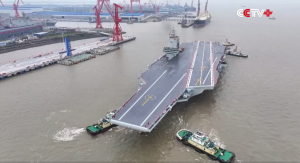China’s third and newest aircraft carrier, the Fujian, has begun its maiden sea trials, Chinese official media said on May 1, as Beijing strives to boost its anti-access/area denial capabilities against the United States’ forces around the disputed South and East China Seas and Taiwan Strait. The Fujian is China’s largest warship to date.
Citing the People’s Liberation Army Navy’s announcement, Chinese state news agency Xinhua reported that the Fujian left the Jiangnan Shipyard in Shanghai for its first test voyage at about 8 a.m. on May 1. The sea trial is intended for testing the carrier’s propulsion and electric power systems, it said.
Xinhua didn’t elaborate on details such as the schedule and planned location of the trial.
But prior to this test voyage, the Shanghai Maritime Safety Administration, under China’s Ministry of Transport, on April 30 issued a navigational hazard safety notice to establish an off-limits zone for military exercises in waters off the coast about 100 kilometers east of Shanghai from 7 a.m. on May 1 until 9 a.m. on May 9. The aircraft carrier is expected to conduct tests in that sea area during that period.
Launched in June 2022, the Fujian is China’s first aircraft carrier equipped with advanced electromagnetic catapults and arresting devices for launching and landing fighter jets.
Specifically, it is equipped with the so-called CATOBAR (Catapult Assisted Take-Off But Arrested Recovery) system, whereby planes are launched by catapults and recovered by arrestor wires. This not only enables the Fujian to launch more fighter-bombers at one time, but also allows fighter jets to carry much heavier loads than the alternative short takeoff systems used by most of the navies operating aircraft carriers.
The Fujian has a full displacement of more than 80,000 tons and a length of about 316 meters. There is, as yet, no real detail for how many jets the ship can carry, but the 2023 Defense White Paper published by the Japanese Defense Ministry in July 2023 said the Fujian can carry 60 to 70 aircraft, including J-15 fighters and KJ-600 airborne early warning and control aircraft.
In contrast, the Liaoning, a refurbished Ukrainian carrier that became China’s first aircraft carrier, has a full load displacement of 58,500 tons and a length of about 305 meters. Meanwhile, the Shandong, China’s first indigenously built carrier, has a full load displacement of 66,000 tons and a length of 315 meters.
Both carriers can carry around 40 aircraft. China’s first two aircraft carriers use the ski jump-style STOBAR (Short Take-off, Barrier-Arrested Recovery) system, which allows carrier-based aircraft to glide on the flight deck and take off under their own power, without the aid of a catapult.
The Fujian was named after Fujian Province, where President Xi Jinping worked for years before rising to the nation’s supreme leader. The Chinese carrier is expected to be deployed to the PLAN’s East Sea Fleet, which has jurisdiction over the Taiwan Strait off Fujian Province.
China is aiming to strengthen its anti-access/area denial (A2/AD) capabilities in the South and East China Seas and Western Pacific Ocean, which would prevent U.S. aircraft carriers and other aircraft from approaching. Once the Fujian is deployed, China’s naval forces will have unprecedented striking power and stronger power projection capabilities in the Indo-Pacific region.
China’s new Fujian-class aircraft carrier “will increase the striking power of a potential PLAN carrier battle group when deployed to areas beyond China’s immediate periphery,” the U.S Defense Department’s 2023 China Military Power Report pointed out in October 2023.
“When commissioned, the carrier will be capable of launching various specialized fixed-wing aircraft for early warning, electronic warfare, or antisubmarine warfare missions, increasing the strike power potential of the PLAN,” it cautioned.
The Pentagon expects the Fujian to be commissioned in 2024. Meanwhile, Taiwan’s Ministry of National Defense predicts that the Fujian will enter service in 2025 after completing navigation tests.
China Daily reported the Liaoning underwent 10 sea trials before going into service, and the Shandong conducted nine before its commissioning.

































